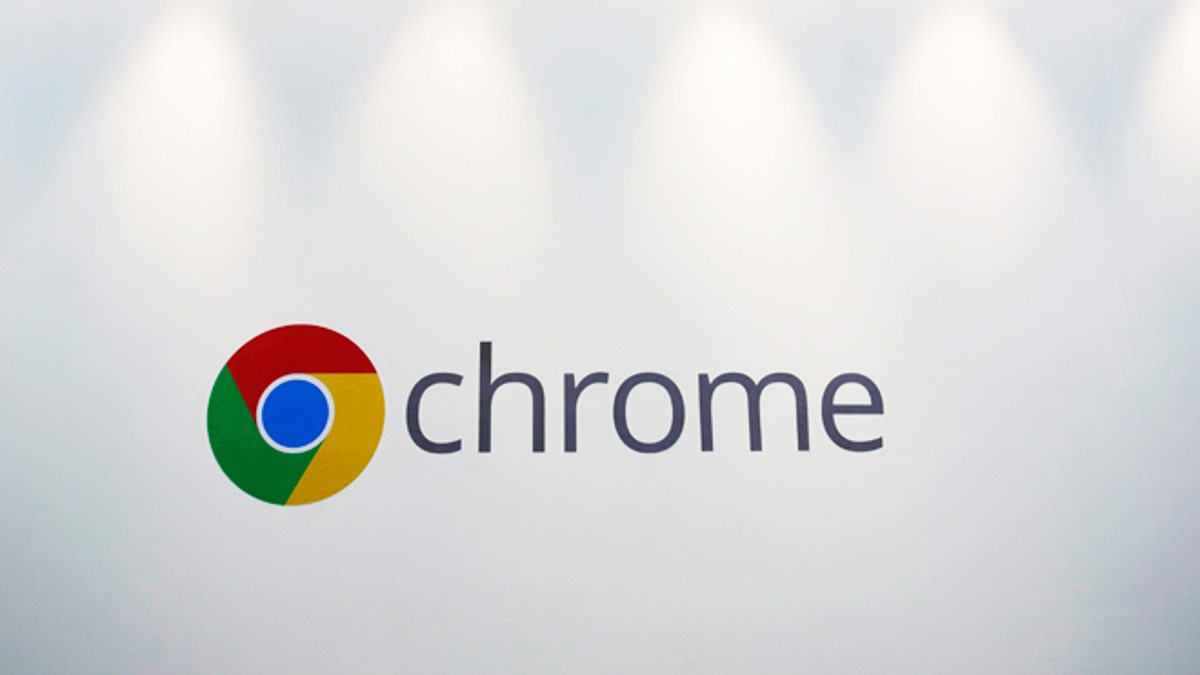
File photo - Oct. 8, 2013: The Chrome logo is displayed at a Google event in New York to unveil a $279 Chromebook. (AP Photo/Mark Lennihan)
Google, which has been accused of invading student privacy via Chromebook computers, fired back at its critics in a blog post late Tuesday.
“Our goal is to ensure teachers and students everywhere have access to powerful, affordable and easy-to-use tools for teaching, learning and working together,” explained Jonathan Rochelle, director of Google Apps for Education, in the blog post. “We have always been firmly committed to keeping student information private and secure.”
Related: Google accused of invading student privacy via Chromebook computers
The Electronic Frontier Foundation (EFF), a digital rights group, depicts the Internet company as a two-faced opportunist in a complaint filed Tuesday with the Federal Trade Commission.
The complaint alleges that Google rigged the Chromebook computers in a way that enables the company to collect information about students' Internet search requests and online video habits. The Foundation says Google is dissecting the activities of students in kindergarten through 12th grade so it can improve its digital services.
The digital rights group also contends Google’s storage and analysis of the student profile violates a "Student Privacy Pledge" that the company signed last year. The pledge, which covers more than 200 companies, contains a provision guaranteeing that students' personal information won't be exploited for "non-educational" purposes.
Related: Go on stage at Carnegie Hall with Google's new performing arts exhibition
“While we appreciate the EFF’s focus on student data privacy, we are confident that our tools comply with both the law and our promises, including the Student Privacy Pledge, which we signed earlier this year,” wrote Rochelle, in the blog post. The co-authors of the Student Privacy Pledge, The Future of Privacy Forum and The Software and Information Industry Association have both criticized EFF's interpretation of the Pledge and their complaint, he added.
In his blog post, Rochelle says that students’ personal data in the Google Apps for Education (GAFE) Core Services is only used to provide the services themselves, so students can do things like communicate using email and collaborate on assignments using Google Docs. There are no ads in the Core Services, and student data in these services is not used for advertising purposes, he added.
Rochelle also described Chrome Sync, which lets Google Account holders log into any Chromebook or Chrome browser and find their apps, extensions, bookmarks, and frequently visited web pages, as a useful and secure tool for students. “Personally-identifiable Chrome Sync data in GAFE accounts is only used to power features in Chrome for that person, for example allowing students to access their own browsing data and settings, securely, across devices,” he said.
Google’s systems compile data aggregated from millions of Chrome Sync users, according to Rochelle, and, after completely removing information about individual users, the tech giant uses the data to improve its services. “This is not connected to any specific person nor is it used to analyze student behaviors,” he wrote. “If they choose to, educators, students and administrators can disable Chrome Sync or choose what information to sync in settings whenever they choose. GAFE users’ Chrome Sync data is not used to target ads to individual students.”
In a statement released Tuesday, the EFF again voiced its concerns about alleged Google snooping. “The primary thrust of our complaint focuses on how Google tracks and builds behavioral profiles on students when they navigate to Google-operated sites outside of Google Apps for Education,” wrote EFF Staff Technologist Jeremy Gillula. “When a student logs into their educational account, and then uses Google News to create a report on current events, or researches history using Google Books, or has a geography lesson using Google Maps, or watches a science video on YouTube, Google tracks that activity and feeds it into an ad profile attached to the student’s educational account—even though Google knows that the person using that account is a student, and the account was created for educational purposes.”
In Google’s blog post Rochelle wrote that schools can control whether students or teachers can use additional Google consumer services - like YouTube, Maps, and Blogger - with their GAFE accounts. “We are committed to ensuring that K-12 student personal information is not used to target ads in these services, and in some cases we show no ads at all,” he wrote. “In Google Search, for example, we show no ads when students are logged in.”
The Associated Press contributed to this report.








































